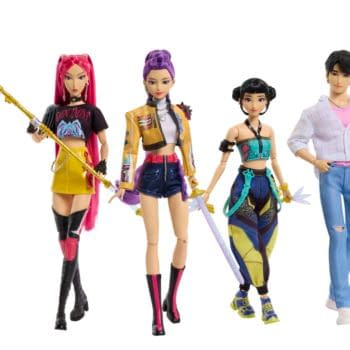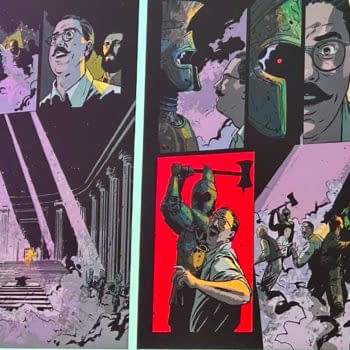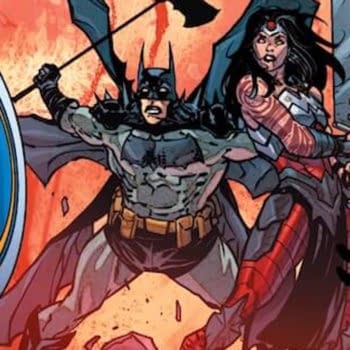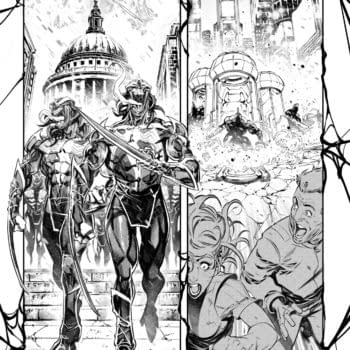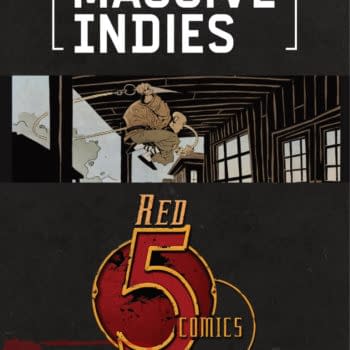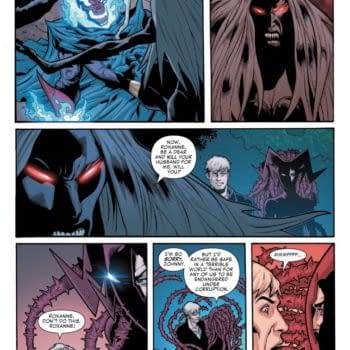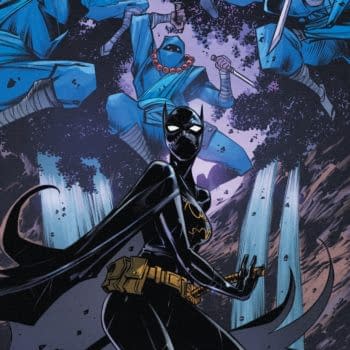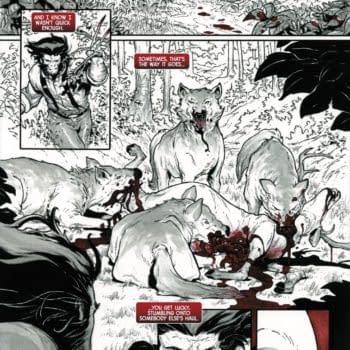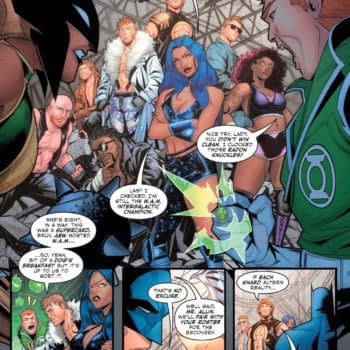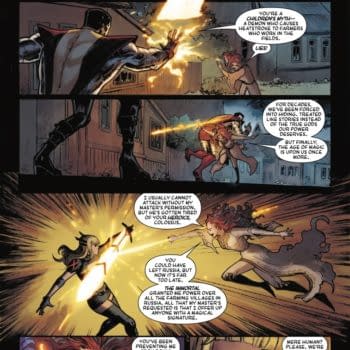Posted in: Comics | Tagged: bechdel test, Comics
The Bechdel Test Applied To Comics…
I've been thinking more and more about the Bechdel Test in the comics I read and write. I was even thinking of writing a column about it. But then Rachel Smith of FloridaGeekScene beat me to it by writing the following;
Alternative comic creator Alison Bechdel (Dykes to Watch Out For, Fun Home) famously penned The Bechdel Test for Movies to gauge the level of gender bias in film. In order to pass the Bechdel Test, a movie simply must satisfy three requirements:
1) Two women
2) Who talk to each other
3) About something other than a man
How would the Bechdel test apply to comics? Take the recent Defenders relaunch, for example.
The Defenders #1
This hotly-anticipated book fails miserably. Although the book features one strong female character, Red She-Hulk, she spends most of the book on a frozen mountain-top getting hit on by a bunch of guys. That fellow Defenders Doctor Strange and Namor waste a bunch of ink sexualizing Red She-Hulk indicates that her comrades (and the book's creators) view her as something other than an equal member of the superpowered team. After all, Bruce Banner's physical attractiveness wouldn't be a theme in the Defenders books.
Bechdel test rating: 0/3
Now, on to some of last week's most popular books.
Action Comics #7
DC's relaunch of Action Comics, penned by fanboy obsession Grant Morrison, has been met with widespread critical acclaim. But, does this week's issue pass the Bechdel Test? No, not even close. To be fair, Superman spends most of the issue alone in space, surrounded by robot aliens and miniaturized worlds. However, women are conspicuously absent even in panels that take place in the tiny Metropolis. The only woman who has any speaking lines is Lois Lane, and when the occasional woman does show up in a crowd, she's running away from the alien threat.
Lois Lane is the only woman in most of the panels, including crowd scenes.
I hear the counterarguments: the protagonist in Action Comics is Superman, and the antagonist is Lex Luthor along with a slew of classic (mostly male) supervillains. Why force female-centered storylines into the forefront when this is a book about men? Remember, the Bechdel test sets a very low bar: two women who talk to each other about anything other than a man. In Action Comics #7, I was hard-pressed to find two women in the same panel, period, which speaks volumes about the way women are depicted in mainstream comics.
Bechdel test rating: 0/3
Animal Man #7
One of DC's most successful titles post-reboot has been Animal Man thanks to Jeff Lemire's (Sweet Tooth, Essex County, Superboy) artful storytelling and Travel Foreman's vivid artwork. Does Animal Man pass the Bechdel test? Yes, but barely. Thanks to a brief conversation between Maxine, the title character's daughter, Animal Man/Buddy Baker's wife and his mother-in-law, where the three women momentarily discuss Maxine's well-being, Animal Man narrowly passes the test.
Not to fear, ladies and gentlemen. After three whole panels where the women briefly focus on Maxine, Bucky's mother-in-law shifts her attention back to Bucky, and we don't see any female-centered dialog for the rest of the book.
Bechdel test rating: A very weak 3/3, since the women were discussing BOTH Maxine and her father.
Fairest #1
Fairest is a spin-off from Bill Willingham's celebrated Fables series on DC's Vertigo imprint. I mistakenly judged this book by its cover, and Willingham's talent for writing engaging stories centering around strong women. I expected Fairest to pass the Bechdel test easily; it doesn't. The story revolves around Ali Baba, The Prince of Thieves, and a blue imp that he finds in a bottle. There is only one conscious woman in the entire book, and she utters a single line at the very end. I'm hopeful that women will be featured more prominently in future issues, but for now, Fairest doesn't even come close.
Bechdel test rating: 0/3
Uncanny X-Men #8
Hmm. This is a tricky one because it features a genderless alien race that only assigns male/female roles when they get married. Among the human characters, which include many women (i.e., Storm, Hope, Magik, Psylocke, Emma Frost), none of them speak to each other. However, Storm and Psylocke have extensive conversations with the genderless alien. However, the alien explains that neither he/she nor his/her partner want to be the "wife" in the relationship, so whatever its gender, it probably isn't female. Fascinating that among a supposedly enlightened, advanced civilization, nobody wants to be a woman. Thanks, Marvel!
Bechdel test rating: 0/3 (1/3 – Accuracy Rich.)
Ah, Namor. Always a gentleman.
There is a variation of the Bechdel test that highlights the lack of diversity in film, books, and other media:
1) Two people of color
2) Who talk to each other
3) About something other than a white person
Using this version of Bechdel test, no book would pass. Zero. It's 2012, but there are still no people of color living in Metropolis. Again, the Bechdel test is a very, very low bar. What does this all mean? It's no surprise that there is a lack of diversity in mainstream comics, but the fact that women and people of color aren't featured prominently (or at all in many cases) in these books doesn't mean that they shouldn't be. Plenty of women create comics; look at the alternative comic industry. Names like Julia Wertz, Liz Prince, Sarah Glidden and of course Alison Bechdel dominate the alternative comic world. So, it's not that women don't read comics, and it's not that we don't create comics; we're just not reading mainstream imprints because, frankly, DC, Marvel, Image and the big names don't want our business.
A quick standard Bechdel look at this week's titles, Avengers Assemble 1/3, Wolverine And The X-Men 3/3 (but 2 of those are in one panel), Batgirl 3/3, Batwoman 3/3, Journey Into Mystery 1/2, Demon Knights 3/3 (though Shining Knight would disagree), Saucer Country 3/3, Avengers 3/3 (thanks to one panel), Superboy 3/3, Queen Crab 3/3, Crossed 1/3, Saga 1/3…







